 Remove only man made litter along South Walton’s beaches as natural debris in place provides nesting benefits to shorebirds and other wildlife
Remove only man made litter along South Walton’s beaches as natural debris in place provides nesting benefits to shorebirds and other wildlife
A well-intentioned recommendation from Volunteer Florida urging eager people to move beach litter above the high water line to make cleaning up oil that may come ashore easier may prove harmful to beach nesting shorebirds.
Florida’s beaches and marshes are the nesting sites for many different species of birds—Plovers, Terns, Gulls, Pelicans, Herons, Egrets, Rails, and more. Beach and marsh nesting birds camouflage their nests, which are usually found above the high water line. In many cases, eggs blend in perfectly with the sand, are hard to see and are easily stepped on and can be inadvertently crushed.
If parent birds are frightened off of their nests even temporarily, eggs and chicks are exposed to extreme weather (sun or rain) as well as predators. Moving beach litter from the shoreline into dunes and areas above the high water line will lead to impacts to nesting birds and could result in damage to the dunes.
Volunteer Florida posted a handout on its website directing people to move litter above the tidal line. This recommendation was apparently made without guidance from wildlife biologists. Audubon has contacted Volunteer Florida and requested that the recommendation be removed or altered.
Audubon has also urged that the Florida Fish and Wildlife Conservation Commission (FWC) to be consulted for direction on appropriate measures to protect wildlife while preparing for potential oil landfall.
For those who want to clean litter from the beaches in anticipation of oil coming ashore, Audubon recommends the following:
· Use approved access points and respect posted areas and do not remove posts or twine.
· Stay below the tidal line.
· Leave natural debris in place because it provides nesting benefits to shorebirds and other wildlife.
· Only remove man-made litter.
· Do not place litter in the dunes or above the high water line.
· Don’t use equipment such as rakes, shovels or tractors.
· Do not bring dogs onto the beach (dogs are a primary sources of beach bird disturbance and mortality.)
Audubon is asking the news media and volunteer agencies to spread the word that we need to wait for formal direction from agencies coordinating the incident response.
Audubon is encouraging willing volunteers to add their name to our volunteer registry so we can connect folks with appropriate activities when they are made available.The disastrous spill and leakage of oil from the sunken Deepwater Horizon oil rig is drifting toward Florida’s Gulf Coast. Help rescue Florida’s coastal birds. The 3,200-square-mile slick is just miles from Florida’s pristine, westernmost Panhandle beaches. If efforts to stop its progress fail and oil continues to drift toward us and along the peninsula, it could harm birds, seagrass beds, coastal marshes, and eventually the mangrove islands off the Florida Keys.
For more information about helping Florida’s birds and volunteer, go to: http://fl.audubonaction.org/site/MessageViewer?em_id=5501.0&autologin=true
